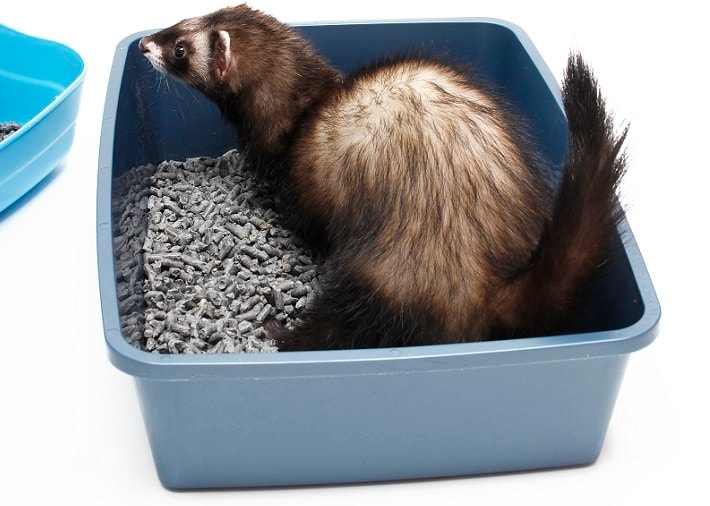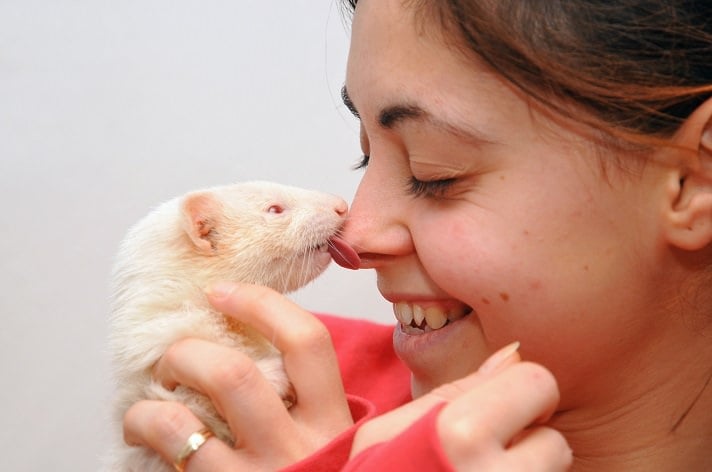Signs. They are everywhere. They tell us everything from where we are to what we can or cannot do. Road signs give us directions, and warning signs help keep us safe. Our ferrets give us signs, too, that help us navigate through caring for them during their lifetimes. Ferret owners just need to learn how to read the signs and interpret them.
As our ferrets age, changes take place in their bodies. We all recognize the signs that tell us they are getting older when they slow down, don’t play as much and sleep more. As they reach the twilight of their life, other subtle signs may emerge. Learning to recognize the signs, and understanding how to read them, can help us be better prepared to make end-of-life decisions for our ferrets when the time comes.
Recognizing That A Ferret Will Soon Pass
Our first responsibility and best option is to preserve life. Anytime a ferret is showing signs of illness its veterinarian should be consulted. Many health problems can be resolved and quality of life restored. Effective pain management has provided many additional enjoyable months of life for many ferrets. Medication adjustments can keep the ferret comfortable. Unfortunately, though, there will come a day when nothing more can be done and we must say goodbye.
Not all ferrets will decline at the same rate or in the same pattern, because the cause of decline will vary; therefore, the visible signs associated with passing can be quite different. But a few constants seem to be universal hallmarks that life is coming to a close.
Aside from traumatic or crisis situations, a ferret may simply decline to the point that it no longer eats or drinks. Lack of interest in food or water may be the first indication that a ferret’s need for nutrients has declined or stopped. If your ferret clamps its jaws and declines food and water, it is often best not to force-feed it. Consult your ferret’s veterinarian to ask whether it should receive emergency care.
Your ferret may be sleeping much more than usual or be lethargic and unresponsive while being handled. A dying ferret will usually allow itself to be wrapped in a blanket and held while most ferrets would only briefly tolerate this imposition. A ferret usually does not resist being held at this point in its life unless being handled is painful to it. If your ferret appears to be in pain, or is lethargic and avoids being touched, it needs to be seen by its veterinarian.
Once the process of death has begun and the organs begin to shut down, little can be done to change the course of events. When this happens, consult with your veterinarian for approval; you may then choose to allow your ferret to pass away with you at home. What can you expect?
Providing Comfort For A Ferret’s Final Hours
At this point, keeping your ferret comfortable is the best you can do for it. Offering water from your fingertip occasionally allows your ferret the option to lick a few drops if its mouth is dry without forcing it to drink if it doesn’t wish to drink. Keep your ferret wrapped in a blanket to conserve its body heat and keep it comfortable. This may also provide your ferret with a feeling of security.
Your ferret’s breathing may become irregular and shallow. Fluids may begin to accumulate in the lungs causing what is known as a “death rattle.” As its heart and lung functions continue to diminish, its body temperature will drop and a dusky blue coloration may become noticeable around its mouth and nose area, paw pads and, possibly, its tongue.
Make the most of these final moments together by taking this opportunity to enjoy cuddling your ferret. Remembering all your ferret’s funny antics and unique personality may help ease the pain of your loss.
Even if it is resting comfortably in a blanket in your arms, your ferret may become restless if the need arises for a visit to the litter box. Ferrets are fastidious creatures and go to great efforts not to eliminate in the area they occupy. Allow your ferret to do its business, and it will probably be happy to be wrapped in its blanket and cuddled again. At some point, its kidneys will fail to the point that urine production will be minimal.
As the process continues, your ferret’s nervous system will be impacted. It will be less and less aware of its surroundings. Its eyes may appear pinched and the ability to blink or close its eyes will cease, as will its ability to swallow. Your ferret will become increasingly weaker.
Some ferrets, at the late stages of passing, may encounter a brief burst of energy, wanting to walk or possibly just becoming a bit restless. This is a normal part of the process and not an indication that a ferret’s condition is improving.
At this point, a ferret usually tries to get as close to you as it can. It is believed the sense of hearing is the last to be lost (in humans), so talking to your ferret is probably reassuring for you both. Many owners take this time to tell their ferret about the Rainbow Bridge and give their blessing to depart.
Once the heart stops, all muscles initially relax. A ferret’s bladder and bowel will empty and passing has occurred. There is no standard timeline, and things may happen in different orders. The course of events may transpire within an hour or last what will seem like forever. It is a difficult time.
Not all ferrets peacefully and quietly pass in your arms. Certain illnesses can bring about seizures or other disturbing behaviors. It may become necessary to prevent needless pain and suffering by taking your ferret to its veterinarian for assistance in passing. This is never an easy decision and is always a very personal choice between a ferret owner and the veterinarian.
Consider the possibility that your ferret may one day need euthanasia before the need arises. It can be very traumatic to witness a beloved ferret suffer as it is passing away. Research available options beforehand, because several methods of euthanasia are available. Ask your veterinarian which method he or she prefers.
Understanding what to expect during your ferret’s final hours may help reduce the stress of the event when it becomes necessary to say goodbye.
Posted By: Chewy Editorial
Featured Image: eurobanks/iStock/Thinkstock
Share:









